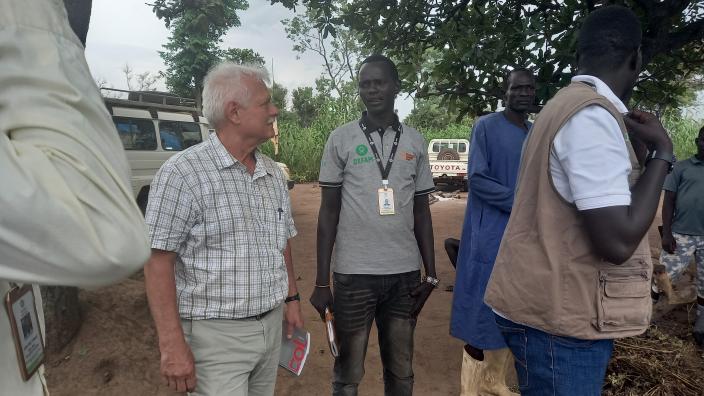A humanitarian delegation led by Oxfam’s Global Humanitarian Director Marta Valdes has concluded a field visit to South Sudan by expressing deep concern over the escalating need for action to support over 300,000 refugees and returnees who came from Sudan to escape the recent conflict, as well as at least 7 million South Sudanese people affected by extreme hunger, impact of climate change and conflicts. The delegation called for a sense of urgency in response to the surging humanitarian needs.
Valdes stressed: “Some areas in South Sudan are still difficult to be accessed by humanitarian workers, the area where people transit is very isolated and the roads have been damaged by flooding, so logistical costs are extremely high and the response is very complex. Despite these challenges, Oxfam is already providing protection, clean water, sanitary and hygiene facilities as well as cash distribution to the returnees and refugees, but this is far from enough.”
The South Sudan Humanitarian Response Plan for 2023 is over 40% unfunded, a significant gap that has spelled unmet needs in communities – who have had to also play host to returnees and refugees running away from the conflict in nearby Sudan.
Oxfam needs at least $40 million in 2024 to support a multisectoral nexus approach to building resilience in communities affected by the crises of conflict and climate change– targeting at least 500,000 people across South Sudan.
Oxfam also calls for simplification of cumbersome procedures restricting aid workers' access to relief zones. During a meeting with Dr Manasse Lomole, the Chairperson of Relief and Rehabilitation Commission of the Government of South Sudan, Marta Valdes reiterated the importance of facilitating humanitarian workers to have unhindered access to communities, enabling them to provide services to those in need. Valdes noted that humanitarian response efforts in South Sudan are facing numerous challenges exacerbated by consistent lack of financial resources, high levels of liability and the additional humanitarian pressure on South Sudan as a result of the conflict in Sudan. Despite the challenges though, Valdes highlighted Oxfam’s commitment to the community by continuing to provide services.

While talking to the returnees and refugees in Renk, Valdes encouraged them to always speak up to any of the Oxfam staff regarding the services the organization is offering to them and what they think needs to be improved.
“The team that is here are the ones mapping out what your needs are, and we work hard to bring the resources, but we only focus on the most urgent need for the refugees and returnee. We will go back and coordinate with the others to see what we can do but for now we can continue with providing sanitation facilities” Marta explained.
The visiting team also included Oxfam Canada’s Executive Director Lauren Ravon, Oxfam Denmark’s Director for International Programs, Niels Hjortdal and Oxfam in Africa’s Head of Humanitarian Programs Robert Lankenau. They visited Rumbek and Renk, meeting officials, communities and Oxfam staff.
During his visit to Rumbek, Niels Hjortdal, the Humanitarian Director for Oxfam Denmark, was highly impressed by the work accomplished by farmers with the support of Oxfam. He expressed his amazement at witnessing the tangible results firsthand, rather than just reading about them on paper.
Hjortdal said: “I’m amazed to see what you have done. I come from a place where I just pass papers around and read them. But to see that what is written on the paper is really happening is incredible. You translate ideas into reality and can produce food, which is enough for your family, and are able to sell the surplus in order to educate your children.”
Hjortdal believes that the work done by the farmers contributes to peace and stability in their communities and ultimately a better life for the people.
Emmanuel Madanga, the chairman of the farmers, expressed his appreciation for the visit and he highly valued the positive working relationship the farmers have with Oxfam staff. He expressed his happiness with their reliability and responsiveness. "They have never made promises they couldn't keep, and they are always available to support us when we need them. This is crucial for us, especially when we have concerns, as they provide us with timely feedback, he said."
The team of humanitarian personnel from across the Oxfam confederation spent five days in South Sudan, holding meetings with various partners, government officials, and the Vice President of South Sudan.

